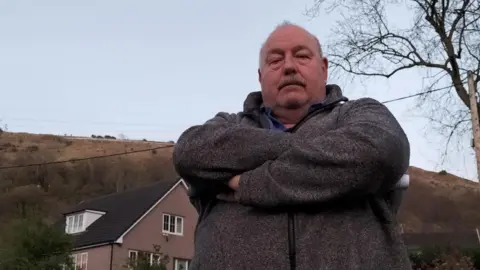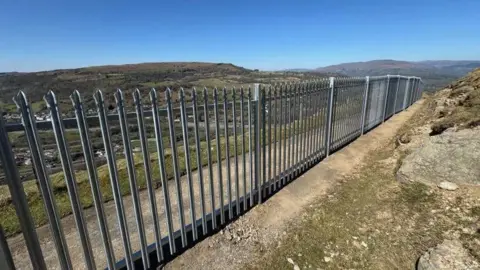Residents and council clash over 'great wall'
 LDRS
LDRSResidents have clashed with a council after a 2.1m galvanised steel fence - dubbed the 'Great Wall of Clydach' by villagers - was put up without notice on a hillside in Monmouthshire.
The 200m (652ft) fence was built along Pwll Du Road, which has been temporarily closed to traffic for five years, and across the face of Gilwern mountain overlooking Clydach.
Residents demanded the "disgusting" fence be taken down at a meeting on Wednesday evening – despite the council's insistence access to the road must be prevented due to fears it could collapse at any moment.
The council apologised after the fence was put up over three days without communicating the plans to residents.
The local authority agreed the fence could potentially be reduced in height and painted a darker colour to reduce its impact - though it was highlighted galvanized steel was not suitable for painting.
It said it would aim to mitigate the impact "as soon as practicable" and when it understood what residents wanted.
The meeting revealed the fence cost £40,000 to buy and install and is only intended as a temporary nine-month measure - though the council said it would consider removing it earlier, according to the Local Democracy Reporting Service.
The highways chief said planning permission was not required for the fence, which is within the Bannau Brycheiniog National Park, but the national park had been informed.
Carl Touhig, who is responsible for highways within Monmouthshire County Council, said previous efforts to keep vehicles off the road including gates and boulders had failed as they had been damaged or removed.
A rockfall in 2023 led the council to commission a report which suggested the road should be closed to people as well as vehicles.
It said options included creating new footpaths over the top of the hill and below the existing road, as well as rebuilding the carriageway further into the mountain - though Mr Touhig said this would cost more than £1m and involve heavy machinery on unstable ground.
 LDRS
LDRSFarmer Wayne Elliot, who was involved in court action that ruled the council was responsible for the road, said: "You could shift the road back, the farmers would help do it, they'd get it done in a week and it would cost you a lot less."
Mr Touhig said: "You can't have farmers going up there to build a road we would adopt. That is not going to happen."
He added blocking the road at either side was not sufficient as the open countryside meant people would still have access from above and below.
The carriageway is almost at the edge of the cliff due to erosion and "a rockfall could take the whole road out", he said.
Mr Touhig said if something were to happen to someone using the road while it was unsafe he could be "prosecuted for corporate manslaughter", adding "someone losing their life would be far worse than a prison sentence".
He said motorcyclists had been using the road, while residents claimed since the fence was put up people have been using it to abseil down the rockface of the old quarry.
Former county councillor Martin Thomas called the fence "disgusting" and said he feared glare from the metal could cause an accident on the recently-competed A465 beneath it.
Among complaints from residents was whether the the potential impact on a breeding pair of peregrine falcons at the quarry had been considered.
The council said it would work with the community on mitigating its impact and to provide a permanent solution.
A further public meeting will be held on 14 May.
